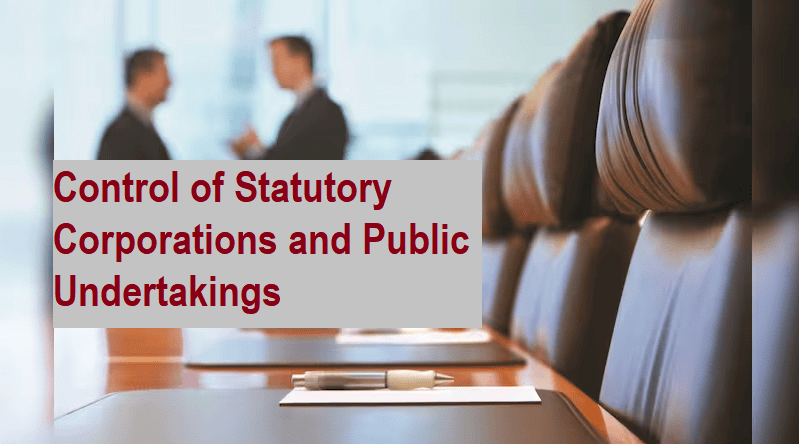Control of Statutory Corporations and Public Undertakings | Administrative Law - CLAT PG PDF Download
| Table of contents |

|
| Introduction |

|
| Judicial Control |

|
| Powers and Duties of Courts |

|
| Dissolution or Supersession of Corporation |

|
Introduction
A 'public corporation' is a term used to describe an organization that has corporate personality, but its exact definition is not fixed by any law or court.
- Public corporations aim to boost economic activity by acting as independent bodies with broad powers.
- While these corporations have significant autonomy, some level of control is necessary to prevent abuse of power and ensure they don't become uncontrolled extensions of the government.
Judicial Control
- Legal Status: Public corporations are legal entities that can sue and be sued. They have perpetual succession and a common seal, and legal proceedings can be initiated in their corporate name.
- Jurisdiction: The jurisdiction of courts over public corporations is similar to that over private or public companies. However, the powers of public corporations are defined by specific statutes, while companies derive their powers from their Memorandum of Association.
- Liability: Public corporations are liable for breaches of contract and tortious acts committed by their employees. They are also subject to taxation unless explicitly exempted and cannot claim Crown privilege.
- Illustrative Cases: Indian courts have taken a liberal approach, intervening when actions of public corporations are illegal, arbitrary, or unreasonable. Courts ensure that public corporations act in accordance with the law in matters like granting jobs, contracts, and licenses. Even though employees of public corporations are not civil servants, principles of service jurisprudence apply to them. Courts have also protected the interests of employees in disputes with large public sector undertakings.
- Court decisions have emphasized that public corporations must act reasonably and fairly in their operations, as seen in the case of LIC of India v. CERC, where the Supreme Court ruled on the terms and conditions set by the corporation.
Powers and Duties of Courts
- Judicial Oversight: Courts have the authority to review the actions of public corporations to ensure they are not arbitrary, unjust, or unfair. While corporations have some flexibility in policy-making, their decisions must align with the rule of law and constitutional principles.
- Principle of 'Play in the Joints': Courts recognize that public corporations need some leeway in decision-making. However, this flexibility is not absolute, and actions that are clearly unjust or unreasonable can be challenged in court.
- Guiding Principles: The actions of public corporations must be guided by public interest and adhere to the Preamble, Fundamental Rights, and Directive Principles of the Constitution. Courts play a crucial role in ensuring that state instrumentalities act within these frameworks.
Governmental Control
- Appointment and Removal of Members: The government typically has the authority to appoint and remove the Chairman and members of a public corporation. This power is a key means of exerting control over the corporation.
- Financial Oversight: The government can exercise control over a public corporation by regulating its finances. This includes requiring government approval for significant capital expenditures and reviewing the corporation's budget and spending plans.
- Audit and Accounts: The Comptroller and Auditor General (CAG) plays a role in auditing the accounts of public corporations, ensuring financial transparency and accountability.
Dissolution or Supersession of Corporation
A constituent statute may empower the Government to abolish, dissolve, or supersede a corporation if it exceeds its authority or abuses its powers. This serves as a check on the corporation's functioning, even if such drastic action is not taken.
- Cancellation, Suspension, or Modification of Acts: An Act creating a corporation may stipulate that all acts and proceedings of the corporation are subject to Government control. The Government has the authority to cancel, suspend, or modify any action taken by the corporation as it deems fit.
- Institution of Enquiries: A statute may grant the Government the power to order enquiries into the corporation's operations under certain circumstances. This serves as a check against deviations from the corporation's established norms.
Directives
- To balance governmental control with the autonomy of public undertakings, the Government may be authorized to issue policy directives to corporations. These directives, affecting the corporation's functions, must not interfere with day-to-day administration. The corporation is obliged to implement such directives. In cases of disputes regarding the nature of a directive, the Central Government's decision is final.
- While these directives should pertain to policy matters and not routine administration, distinguishing between the two can be challenging. In practice, the Government often underutilizes its power to issue policy directives.
Rules and Regulations
- Constituent statutes creating corporations typically include provisions for making rules and regulations. The Central Government is empowered to make rules to implement the Act's provisions. Additionally, the corporation, with prior Central Government approval, can make regulations to facilitate its functions under the Act.
- In instances of inconsistency between rules and regulations, rules take precedence. Regulations enacted without Government approval are considered invalid. This ensures the Government maintains oversight, with rules prevailing over regulations in case of conflict.
|
33 docs|9 tests
|
FAQs on Control of Statutory Corporations and Public Undertakings - Administrative Law - CLAT PG
| 1. What is the role of judicial control in the context of statutory corporations? |  |
| 2. What powers do courts have in relation to the dissolution of corporations? |  |
| 3. How do courts supervise the activities of public undertakings? |  |
| 4. What are the key duties of courts when exercising judicial control? |  |
| 5. What is the significance of judicial control over public undertakings for the economy? |  |















